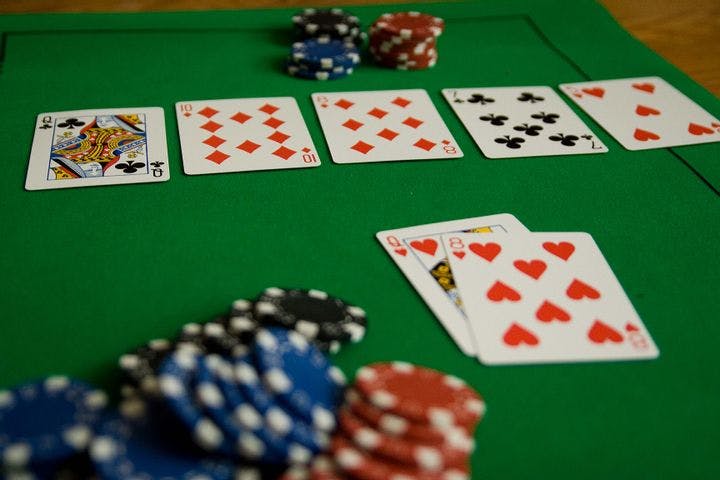Winter 2010
Card Studs
– Aaron Mesh
Americans have long used poker, a homegrown game, to define the kind of people they want to be: shrewd, bold, unflappable, and streetwise.
Not long after graduating from college, I, like millions of other enthusiasts infected by the millennial poker craze, developed a slightly unhealthy interest in no-limit Texas hold ’em. Nearly every Friday night, I bellied up to a basement card table or, if a home game couldn't be found, ventured out to an East Tennessee bar called Mayo’s, where tournaments of dubious legality and $50 buy-ins started every half-hour. Sometimes I won. More often I watched my weekend pocket money go out the door in somebody else’s pocket. After bad nights, I would brood over the suspicion that my inability to bet aggressively signaled a deficiency of character.
I wasn't alone in drawing this parallel. Among James McManus’s many insights in Cowboys Full is the observation that Americans have long used their homegrown game—a modified French bluffing contest—to define the kind of people they want to be: shrewd, bold, unflappable, and streetwise. In tracing poker’s lineage from Mississippi riverboats to televised tournaments, McManus argues that gambling strategies influenced national history from the fresh-start aspirations of Franklin D. Roosevelt’s New Deal (named after the shuffling and distribution of cards) to the deployment of the insuperable atom bomb (described by a Manhattan Project scientist as “a royal straight flush”). Devised in polyglot 1800s New Orleans and honed on riverboats, poker developed as a uniquely American recreation: a contest played by free-market people, each individual convinced he was a little more equal than everyone else.
In his last book, Positively Fifth Street (2003), McManus wryly recounted his improbable fifth-place finish in the 2000 World Series of Poker while on a reporting assignment; as a historian, he is no less lively and nimble. Not a page of Cowboys Full goes by without a crackerjack yarn, as McManus shows how the game, like the country, grew in respectability even as its nature remained fundamentally freewheeling. He compares steamboat cardsharps of the 1830s to the bling-sporting rappers of today and makes a case for poker as the true national pastime, capable of righting baseball’s wrongs: Arnold Rothstein, the mobster who fixed the 1919 “Black Sox” World Series, was shot dead after refusing to pay his losses in a stud game he thought was rigged. McManus revives the legends of high-stakes gunslingers Wild Bill Hickok and Doc Holliday, but he also shows how friendly games became a staple of the FDR and Truman Oval Offices. Poker even hewed the destiny of Richard Nixon, who as a World War II Navy lieutenant used his “iron butt” to endure marathon sessions of five-card draw; the $8,000 in winnings he brought home helped stake him to a political career.
In its second half, Cowboys Full shifts focus to the late-20th-century rise of poker as a global spectator sport, with an emphasis on epic Las Vegas tournaments at Binion’s Horseshoe casino and emergent World Series of Poker celebrities such as the laconic Texan Doyle Brunson and cocaine-addicted whiz kid Stu Ungar. The game’s “grittiness and peril might help to explain why its outlaw cachet continues to linger,” McManus writes, “even when today’s live games are played mostly by well-scrubbed folks sipping mineral water in state-sanctioned card rooms.” Cheating may have diminished—though it continues to crop up in online games—but players still feel that they’re getting away with something.
McManus suggests a more philosophical side of the game in the person of Herbert O. Yardley, a code breaker, spy, and poker instructor whose nonchalant resilience over three wars and countless careers becomes the book’s running joke. Yardley’s own book, The Education of a Poker Player (1957), counseled honesty and patience as the virtues of the poker table. “In the end,” McManus writes, quoting the journalist Al Alvarez, “what he is describing is not so much a game of cards as a style of life.” The game that began as a haven for scofflaws, layabouts, and swindlers can build character, too.
* * *
Aaron Mesh is a film critic and general assignment reporter for Willamette Week, an alternative newspaper in Portland, Oregon.
Reviewed: "Cowboys Full: The Story of Poker" by James McManus, Farrar, Straus & Giroux, 2009.
Photo courtesy of Flickr/maorix
Up next in this issue
